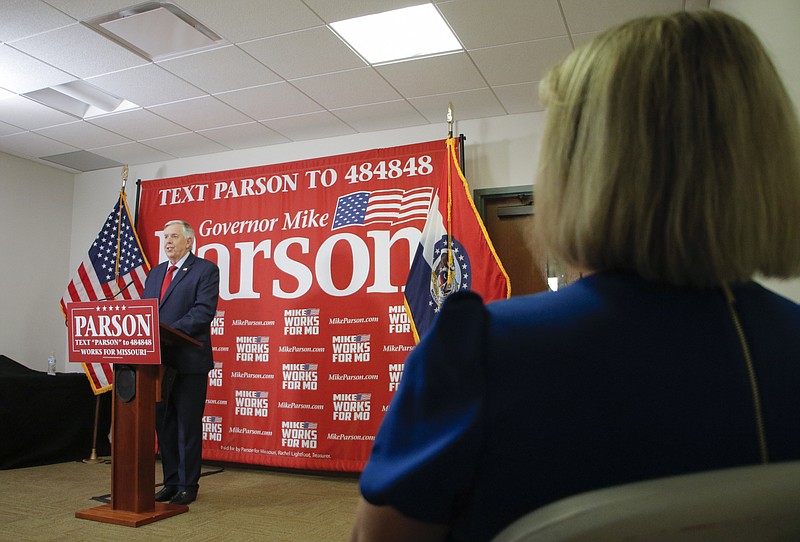A political showdown between Missouri's incumbent governor and its state auditor for the governorship is now set for the November election.
Incumbent Missouri Gov. Mike Parson won the Republican primary election Tuesday for the governorship against challengers Raleigh Ritter, of Seneca; state Rep. Jim Neely, of Cameron; and Saundra McDowell, of Springfield.
As of approximately 9:45 p.m. Tuesday, Parson had 74.7 percent of the Republican vote, with 1,267 0f 3,575 precincts reporting.
The former lieutenant governor, Parson became governor in June 2018 following the resignation of former Gov. Eric Greitens - making Tuesday the first time Missouri voters have selected him for the position he currently holds.
Parson said at an election night event at the Missouri Chamber of Commerce in Jefferson City: "As governor, I have been tested since day one - leading Missouri through historic drought, floods, tornadoes, COVID-19 and civil unrest - and I am ready to continue moving this state forward."
In the next four years, Parson said, he would "ensure law and order" against violent criminals, continue to pursue development of the workforce and economy, and repair the economy after the damage of the pandemic.
Nicole Galloway, of Columbia - currently Missouri's state auditor - won the Democratic primary for the governorship against Jimmie Matthews, Antoin Johnson and Robin John Daniel Van Quaethem, all of St. Louis, as well as Eric Morrison, of Kansas City.
As of approximately 9:45 p.m., Galloway had 85.8 percent of the Democratic vote, with 1,267 0f 3,575 precincts reporting.
Galloway was appointed state auditor in April 2015, following the death of elected auditor Tom Schweich that February. She was elected to the office in 2018.
Galloway said during a remote event Tuesday night that Missouri cannot return after COVID-19 to where it was on the eve of the pandemic, because "where we were wasn't good enough for too many Missourians."
"I knew then that Missouri's working families needed change. I'm even more certain of it now," she said.
"The most important thing the next governor will have to do is contain the spread of the virus and rebuild Missouri's economy," she said. " We need a reset on our coronavirus strategy" - including a need for universal testing, she said.
Libertarian candidate Rik Combs, of Lohman, and Green Party candidate Jerome H. Bauer, of St. Louis, were unopposed in the primary.
Lieutenant governor
Missouri voters also set up a race in November for the position of lieutenant governor between incumbent Republican Lt. Gov. Mike Kehoe and Democratic former Kansas City Council member Alissia Canady.
Kehoe, of Jefferson City, won against challengers Arnie C. AC Dienoff, of O'Fallon; Aaron T. Wisdom, of Williamsburg; and Mike Carter, of St. Charles.
As of approximately 9:45 p.m. Tuesday, Kehoe had 59.2 percent of the Republican vote, with 1,267 0f 3,575 precincts reporting.
Kehoe was appointed by Parson in June 2018 to be lieutenant governor - also making Tuesday night the first time Missouri voters selected Kehoe for the position he currently holds.
He said Tuesday night he was "very humbled" to win Missourians' support, with the primary being his first time running in a statewide election.
Going forward, Kehoe said, his campaign's message will continue to include "less government and more common sense."
As of approximately 9:45 p.m., Canady had 70.5 percent of the Democratic vote, ahead of St. Charles small business owner Gregory Upchurch, with 1,267 0f 3,575 precincts reporting.
Canady said Tuesday night she felt invigorated.
"We need to have some honest conversations about what it's going to take to move us forward post-COVID-19," she said, adding that personal differences have to be set aside, particularly to help the economy recover.
Libertarian candidate Bill Slantz, of St. Charles, and Green Party candidate Kelley Dragoo, of Kansas City, ran unopposed in the primary.
Other statewide races
Rich Finneran beat Elad Gross - fellow Democratic candidate from St. Louis - to be the party's nominee for attorney general on the November ballot.
As of approximately 10:45 p.m., Finneran had 56.8 percent of the Democratic vote, with 1,961 0f 3,575 precincts reporting.
Finneran is a St. Louis-area lawyer who served as an assistant U.S. attorney in St. Louis from 2010-17, according to the Associated Press. He now works at St. Louis law firm Bryan Cave Leighton Paisner and is a law instructor at Washington University.
Incumbent Republican Attorney General Eric Schmitt, of Kirkwood, ran unopposed, as did Libertarian candidate Kevin C. Babcock, of St. Louis.
For secretary of state, all candidates ran unopposed on Tuesday: incumbent Republican Jay Ashcroft, of Jefferson City; Democrat Yinka Faleti, of St. Louis; Libertarian Carl H. Freese, of Foristell; Green Party candidate Paul Lehmann, of Fayette; and Constitution Party candidate Paul Venable, of Moberly.
For state treasurer, all candidates ran unopposed in Tuesday's primary: incumbent Republican Scott Fitzpatrick, of Cassville; Democrat Vicki L. Englund, of St. Louis; Libertarian Nick Kasoff, of St. Louis; and Green Party candidate Joseph Civettini, of St. Louis.

